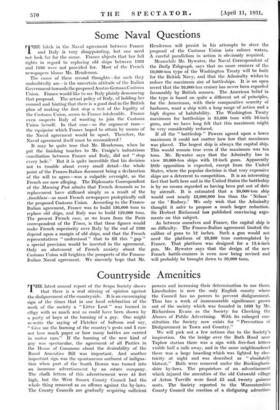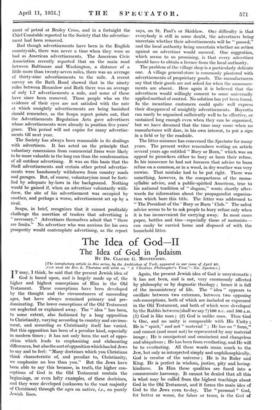Countryside Amenities
THE latest annual report of the Scapa Society shows that there is a real stirring of opinion against the disfigurement of the countryside. It is an encouraging sign of the times that in one local celebration of the work of the society a " Litter Lout " was burned in effigy with as much zest as could have been shown by a party of boys at the burning of a guy. One might re-write the saying of Fletcher of Saltoun and say, " Give me the burning of the country's pests and I care not how much paper or how many bottles are carried in motor cars." If the burning of the new kind of guy was spectacular, the agreement of all Parties in the House of' Commons about the desirability of the Rural Amenities Bill was important. And another important sign was the spontaneous outburst of indigna- tion when part of the South Downs was turned into an immense advertisement by an estate company. The chalk letters of this advertisement were 45 feet high, but the West Sussex County Council had the whole thing removed as an offence against the by-laws. The County Councils are gradually acquiring sufficient powers and increasing their determination to use them. Lincolnshire is now the only English county where the Council has no powers to prevent disfigurement. Thus has a work of immeasurable significance grown out of the society which was founded in 1893 by Mr. Richardson Evans as the Society for Checking the Abuses of Public Advertising. With its enlarged con- stitution the Society now exists for " Prevention of Disfigurement in Town and Country."
We will pick out a few actions due to the Society's inspiration. On the bridge over the Bath Road near Taplow station there was a sign with five-foot letters visible half a mile away, and in the same neighbourhood there was a large hoarding which was lighted by elec- tricity at night and was described as " absolutely blatant." Both were removed under the Buckingham- shire by-laws. The proprietors of an advertisement which injured the amenities of the old Cotswold village of Acton Turville were fined £5 ands, twenty guineas costs. The Society reported to the Worcestershire County Council the erection of a disfiguring advertise- went of petrol at Beoley Cross, and in a fortnight the Chief Constable reported to the Society that the advertise- ment had been removed.
Bad though advertisements have been in the English countryside, there was never a time when they were so bad as American advertisements. The American Civic Association recently reported that on the main road between Baltimore and Washington, a distance of a little more than twenty-seven miles, there was an average of thirty-nine advertisements to the mile. A recent survey on the Bath Road showed that in the ninety miles between Hounslow and Bath there was an average of only 1.7 advertisements a mile, and some of these have since been removed. Those people who on the evidence of their eyes are not satisfied with the rate at which unsightly advertisements are being banished should remember, as the Scapa report points out, that the Advertisements Regulation Acts gave advertisers whose advertisements were already in position five years' grace. This period will not expire for many advertise- ments till next year.
The Society has always been reasonable in its dealings with advertisers. It has acted on the principle that voluntary concessions from commercial firms were likely to be more valuable in the long run than the condemnation of all outdoor advertising. It was on this basis that the Shell advertisements and certain other petrol advertise- ments were handsomely withdrawn from country roads and garages. But, of course, voluntaryism must be forti- fied by adequate by-laws in the background. Nothing would be gained if, when an advertiser voluntarily with- drew, the site of his advertisement was occupied by another, and perhaps a worse, advertisement set up by a rival.
Scapa, in brief, recognizes that it cannot profitably challenge the assertion of traders that advertising is " necessary." Advertisers themselves admit that " there are limits." No advertiser who was anxious for his own prosperity would contemplate advertising, as the report says, on St. Paul's or Skiddaw. On difficulty is that everybody is still in some doubt, the advertisers being uncertain whether their advertisements will be " passed," and the local authority being uncertain whether an action against an advertiser would succeed. One suggestion, which seems to us promising, is that every advertiser should have to obtain a licence from the local authority.
The problem of the village shop is a particularly delicate one. A village general-store is commonly plastered with advertisements of proprietary goods. The manufacturers say that their goods are not asked for when the announce- ments are absent. Here again it is believed that the advertisers would willingly consent to some universally applied method of control. No solution has yet been found. In the meantime customers could quite well express their disapproval of unsightly advertisements. Boycotts can rarely be organized sufficiently well to be effective, or sustained long enough even when they can be organized, but we have dreamed that the time may come when no manufacturer will dare, in his own interest, to put a sign in a field or by the roadside.
The litter nuisance has concerned the Spectator for many years. The present writer remembers writing an article several years ago entitled " Bury or Burn," which was an appeal to picnickers either to bury or burn their refuse. In his innocence he had not foreseen that advice to burn refuse on a common, or in a wood, in dry weather was very unwise. That mistake had to be put right. There was something, however, in the compactness of the mona- syllabic advice, and a public-spirited American, true to his national tradition of " slogans," wrote shortly after- wards for information about the propagandist organiza- tion which bore this title. The letter was addressed to " The President of the Bury or Burn ' Club." The safest advice seems to be to ask people to bury refuse only when it is too inconvenient for carrying away. In most cases paper, bottles and tins—especially those of motorists— can easily be carried home and disposed of with the household litter.











































 Previous page
Previous page